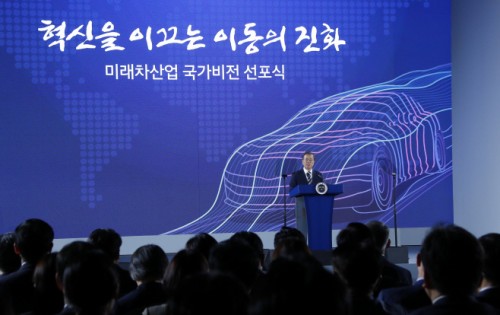 |
| President Moon Jae-in delivers a speech at Hyundai Motor’s Namyang R&D Center in Hwaseong, Gyeonggi Province, on Oct. 15, 2019./ Source: Yonhap News |
By AsiaToday reporters Choi Won-young & Lee Chul-hyun & Hong Sun-mi
“We will be the first in the world to commercialize autonomous driving. Flying cars will be also developed, and the future car service market will grow by 30 percent every year.”
President Moon Jae-in’s remarks came during a proclamation ceremony for the national vision of the future car industry, at Hyundai Motors Namyang R&D Center n Hwaseong, Gyeonggi Province, on Tuesday afternoon. “We will be the first and the best in the world in future cars and lead the ear of the Fourth Industrial Revolution with future cars. We are ready and passionate enough to lead a new era of technology,” Moon said.
South Korea aims to become the world’s No. 1 powerhouse in the future vehicle industry by 2030, the government said. The government predicted that the sales proportion of electric and hydrogen-powered vehicles would be expanded to 33 percent by 2030, while more than half of the new cars would be autonomous driving vehicles. The mobility service market is expected to grow rapidly to $1.5 trillion. In this process, the government plans to implement a green vehicle distribution target system for carmakers and expand the domestic market by focusing on logistics means and public transportation.
In line with the growing demand, the government plans to install 15,000 rapid chargers for electric vehicles by 2025 and 660 hydrogen charging stations by 2030 across the country. If the sales proportion of future cars increases to 33 percent, greenhouse gas emissions and fine dust would be reduced by 36 percent and 11 percent each.
Another major goal stressed by President Moon is the task of being the first country in the world to commercialize self-driving cars. So far, the policies related to self-driving have been based on Level 3, where vehicles can only be self-driving mode in certain conditions. But now, the country aims to commercialize Level 4 cars, where vehicles are fully autonomous on major roads without the involvement of drivers, by 2027, or three years earlier than planned.
To this end, the government plans to complete four major infrastructures, including wireless communication networks between cars and roads, three-dimensional precision maps, integrated control system, and road signs by 2024. It will also revise related laws and regulations for autonomous driving, such as standards for safety and insurance rules.
Next year, the government will designate pilot zones for autonomous passenger traffic and logistics. If the rate of autonomous cars supply achieves 54 percent by 2030, the number of people killed in traffic accidents will decrease to less than 1,000 from some 3,800.
#electric cars #hydrogen cars #future cars #Moon Jae-in #commercialize
Copyright by Asiatoday
Most Read
-
1
-
2
-
3
-
4
-
5
-
6
-
7





















